Table of Contents
As President Donald Trump enters his second term, the U.S. public’s views on Israel and the ongoing Israel-Hamas war remain deeply divided. With Trump’s approach to foreign policy and his handling of relations between Israel, Palestine, and the broader Middle East, Americans are offering mixed assessments of his actions. The war between Israel and Hamas, which escalated dramatically in 2023, has sparked discussions on the role of the U.S. in the region, and the country’s relationship with Israel is becoming more complex as time goes on.
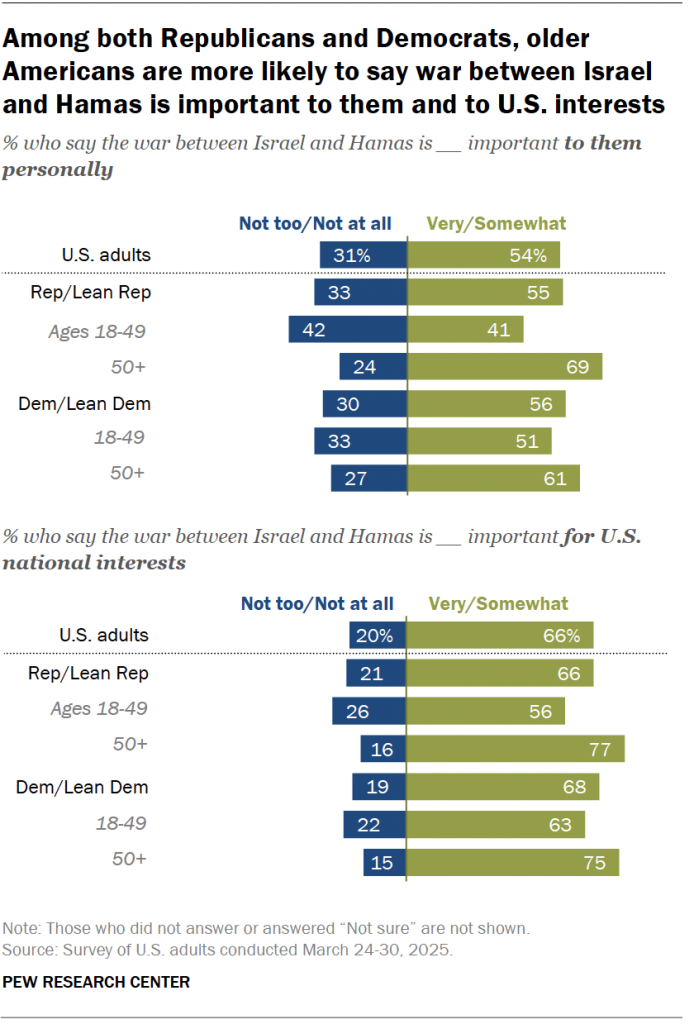
Growing Divisions: U.S. Public Opinion on Israel and Netanyahu
Americans’ opinions of Israel have turned more negative over the past few years. According to a recent Pew Research Center survey conducted in March 2025, 53% of U.S. adults now express an unfavorable opinion of Israel, a notable increase from 42% in March 2022. This shift is largely attributed to the ongoing violence between Israel and Hamas, particularly following the October 7, 2023 Hamas attack and Israel’s subsequent military actions in the Gaza Strip. For the first time, the percentage of Americans with very unfavorable views of Israel has doubled, now reaching 19% compared to just 10% in 2022.
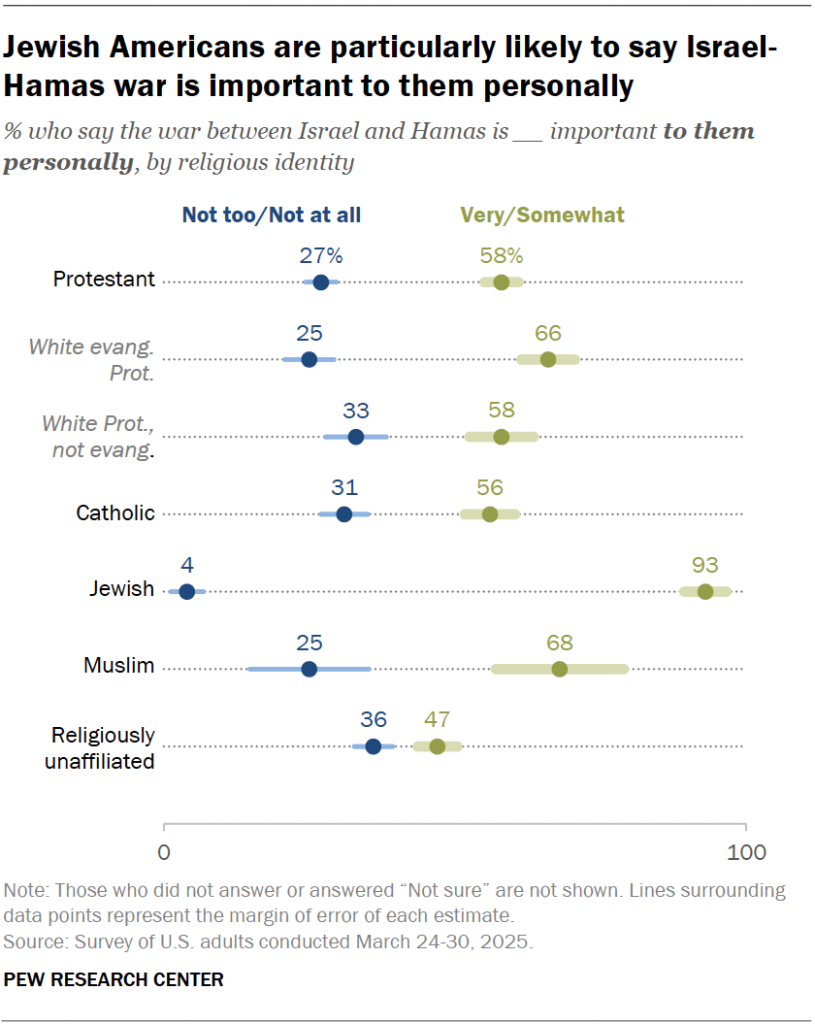
A significant gap exists between Democrats and Republicans regarding their views of Israel. 69% of Democrats now view Israel unfavorably, a stark contrast to 37% of Republicans. While younger Democrats are increasingly critical of Israel, Republicans under 50 are now as likely to hold negative views of Israel as they are positive ones—a shift from 2022, when they overwhelmingly supported Israel. The divisiveness in U.S. public opinion mirrors the broader tensions surrounding Israel’s role in the Middle East and its conflict with Palestinians.
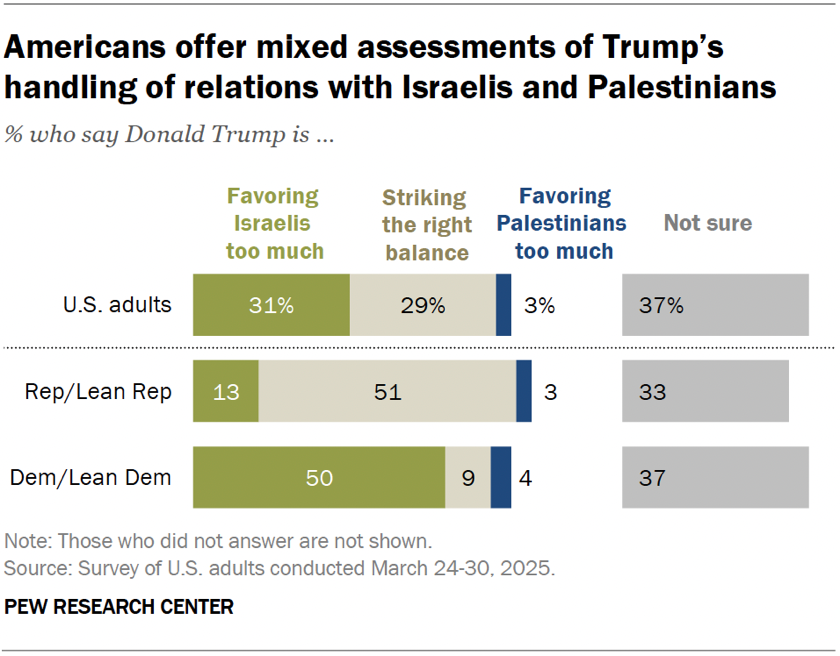
Netanyahu’s Leadership: Confidence in Decline
Israeli Prime Minister Benjamin Netanyahu has seen a significant drop in his favorability among U.S. adults. 52% of Americans report having little or no confidence in Netanyahu’s ability to handle world affairs, a sentiment that has worsened since last year. Only 32% express confidence in his leadership. This dip is particularly notable among Democrats, with only 15% expressing confidence, compared to 51% of Republicans who support his leadership. Jewish Americans are also divided, with 53% expressing little or no confidence in Netanyahu, while 45% maintain confidence in him. In stark contrast, 58% of White evangelical Protestants express confidence in Netanyahu’s handling of global affairs.
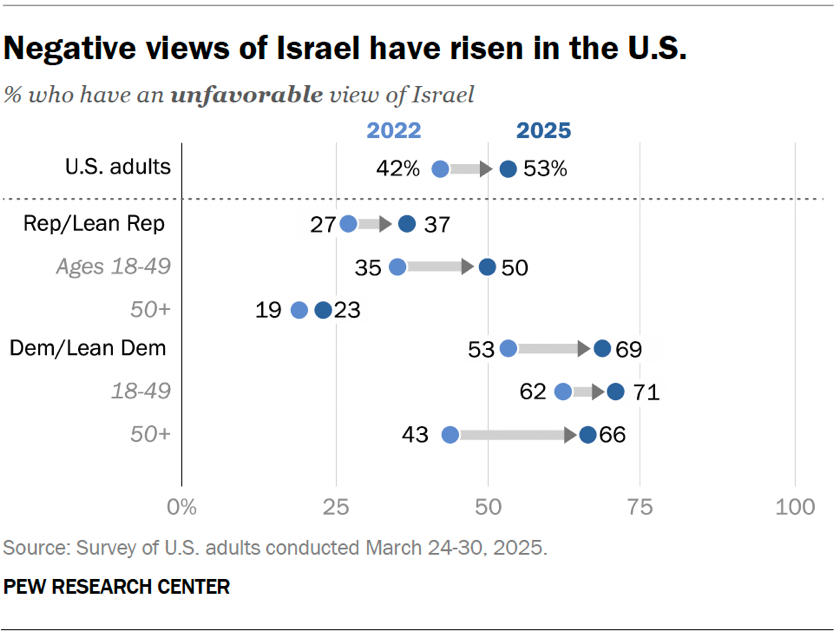
The Israel-Hamas War: Personal and National Importance
While the Israel-Hamas war remains a significant issue for many Americans, its personal importance has waned slightly over the past year. 54% of Americans now say the conflict is important to them personally, a decrease from 65% in early 2024. However, the war still holds considerable significance for certain demographic groups. Jewish Americans are especially engaged, with 93% considering the war either very or somewhat important to them personally. Muslim Americans (68%) and White evangelical Protestants (66%) also feel strongly about the conflict.
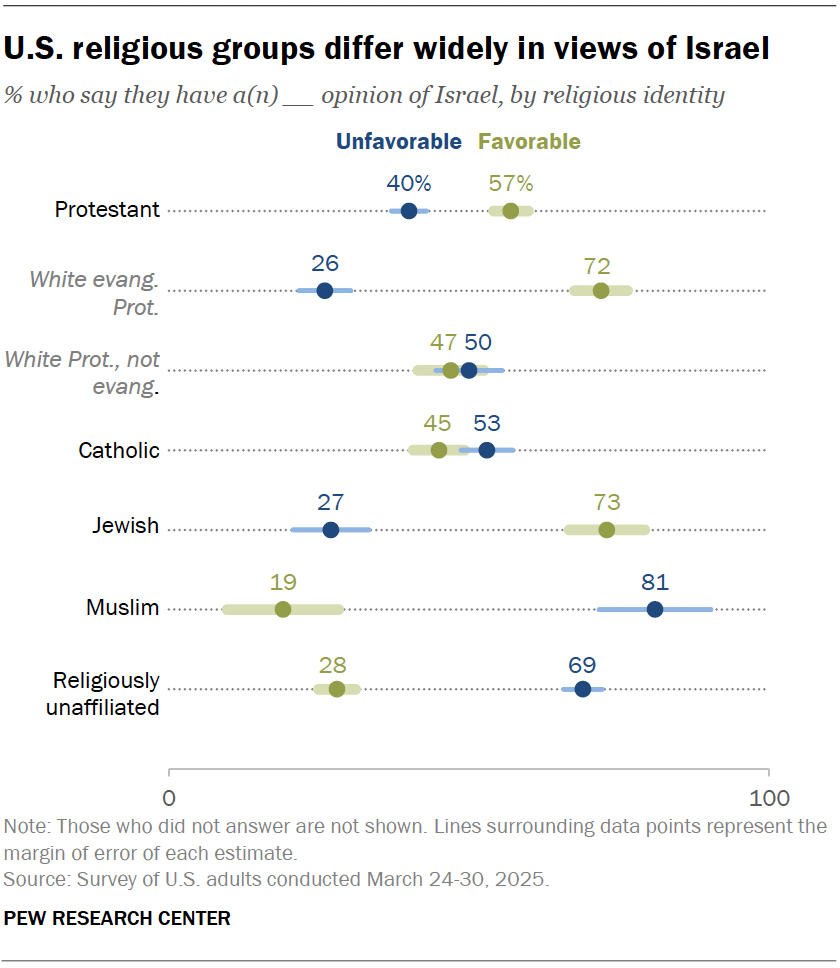
On a national level, 66% of Americans view the war as important to U.S. national interests, though this percentage has dropped by 9 points since the previous year. The opinion is similar across party lines, with both Republicans and Democrats expressing similar views on the importance of the conflict to U.S. interests.
Trump’s Handling of Israeli-Palestinian Relations
Americans are divided over how well President Trump has managed relations between Israel and Palestine. A significant portion of the public feels that Trump is favoring Israel too much, with 31% of Americans holding this view. In contrast, 29% believe Trump is striking the right balance, while 3% say he is favoring Palestinians too much. This divide is particularly notable within the Jewish community, where 36% say Trump is favoring Israel too much, and 43% say he is striking the right balance. When compared to Biden’s handling of these relations, Jewish Americans were more likely to say Biden was favoring Palestinians too much, highlighting a shift in sentiment under Trump’s leadership.
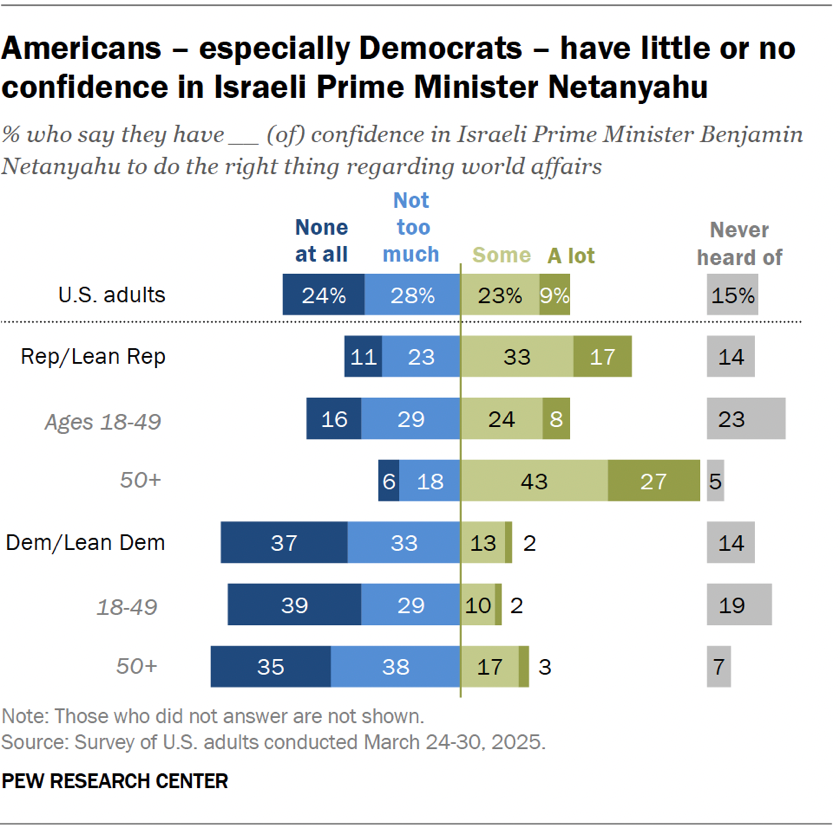
Among Muslim Americans, 70% believe Trump is favoring Israel too much, largely unchanged from their opinions of Biden’s policies in 2024. The division is clear: while Republicans tend to see Trump’s policies as balanced, Democrats are more likely to view his approach as skewed in favor of Israel.
The Two-State Solution: A Path to Peace?
A key question for many Americans is whether Israel and a future Palestinian state can peacefully coexist. Currently, only 46% of Americans believe a two-state solution is possible, down from 52% in late 2023. The perspective is highly divided across party lines. 56% of Democrats see the possibility of peaceful coexistence, compared to just 36% of Republicans. Among religious groups, Muslims are more optimistic about the possibility of a two-state solution (56%) compared to Jewish Americans, where 52% think it is not possible.
Should the U.S. Take Control of Gaza?
One of the more controversial aspects of Trump’s foreign policy has been his suggestion that the U.S. should take control of the Gaza Strip. This idea has garnered strong opposition from the American public, with 62% of Americans opposing the U.S. taking over Gaza. A significant majority, 49%, strongly oppose it, while only 15% support the proposal. Jewish Americans, however, show more support for this move than other religious groups, with 32% in favor of the proposal. The shift in public opinion regarding U.S. involvement in Gaza indicates a growing reluctance to engage in what many see as a highly volatile region.
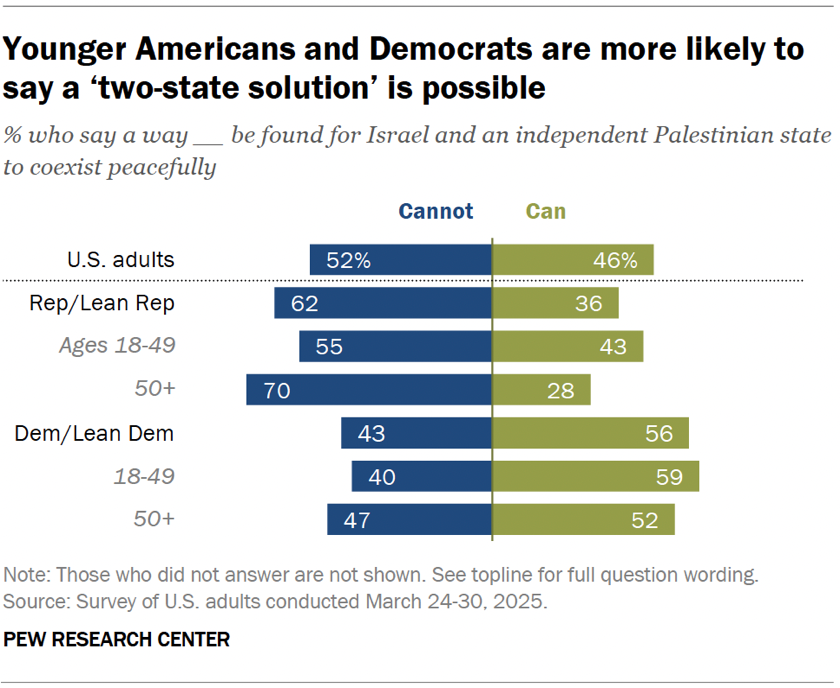
Conclusion: A Divided Nation on the Middle East
As President Trump continues to pursue his second-term foreign policy agenda, American public opinion remains deeply divided on issues related to Israel, the Israel-Hamas war, and U.S. involvement in the region. With mixed views on Netanyahu’s leadership, the potential for peace between Israel and Palestine, and the controversial idea of U.S. control over Gaza, the path forward remains uncertain.
The political divide between Republicans and Democrats on these issues reflects broader ideological differences, with Republicans generally supporting stronger ties with Israel and Democrats expressing more concern about the humanitarian consequences of the ongoing conflict. As the situation continues to evolve, it is clear that U.S. foreign policy in the Middle East will continue to be a source of national debate and division.
Author Profile
- Syed Tahir Abbas is a Master's student at Southwest University, Chongqing, specializing in international relations and sustainable development. His research focuses on U.S.-China diplomacy, global geopolitics, and the role of education in shaping international policies. Syed has contributed to academic discussions on political dynamics, economic growth, and sustainable energy, aiming to offer fresh insights into global affairs.
Latest entries
 U.S. Foreign PolicyFebruary 2, 2026AI and Grand Strategy: The Case for Restraint – Navigating the Future of American Power
U.S. Foreign PolicyFebruary 2, 2026AI and Grand Strategy: The Case for Restraint – Navigating the Future of American Power National SecurityJanuary 31, 2026Treating China’s Connected Energy Systems as a National Security Risk
National SecurityJanuary 31, 2026Treating China’s Connected Energy Systems as a National Security Risk Global HealthJanuary 29, 2026The Future of the WHO—and How the United States Can Shape It
Global HealthJanuary 29, 2026The Future of the WHO—and How the United States Can Shape It Global TradeJanuary 22, 2026Trump Cancels Tariffs on European Nations Over Greenland Pursuit?
Global TradeJanuary 22, 2026Trump Cancels Tariffs on European Nations Over Greenland Pursuit?

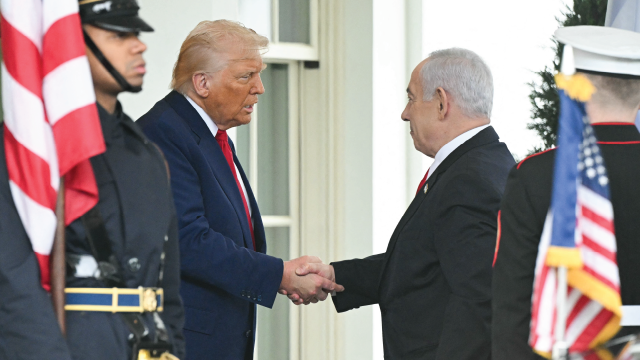

7 comments
Thanks for sharing this—it was really informative ❤️
Hello there I am so happy I found your web site, I really found you by accident, while I was looking on Askjeeve for something else, Regardless I am here now and would just like to say thanks a lot for a incredible post and a all round enjoyable blog (I also love the theme/design), I don’t have time to look over it all at the moment but I have bookmarked it and also added in your RSS feeds, so when I have time I will be back to read more, Please do keep up the superb job.
Howdy very cool blog!! Guy .. Excellent .. Amazing .. I’ll bookmark your blog and take the feeds also?KI’m satisfied to search out a lot of helpful information here within the post, we want develop extra techniques on this regard, thank you for sharing. . . . . .
You completed several nice points there. I did a search on the topic and found a good number of persons will go along with with your blog.
I used to be very pleased to find this internet-site.I needed to thanks to your time for this wonderful learn!! I positively having fun with every little little bit of it and I’ve you bookmarked to check out new stuff you weblog post.
Thank you for the good writeup. It in fact was a amusement account it. Look advanced to far added agreeable from you! However, how could we communicate?
Can you be more specific about the content of your article? After reading it, I still have some doubts. Hope you can help me. https://accounts.binance.info/es-MX/register?ref=GJY4VW8W